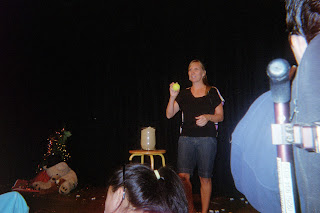You know Dasher, and Dancer, and
Prancer, and Vixen, Coment, and Cupid, and Donder, and Blitzen, but do you
recall the most famous reindeer of all….” Sound
familiar? You know the rest of the words right? I’m sure you do. It’s a famous
Christmas Carol. However, I’ll bet if I were to ask you, “Where did the idea
for Rudolph come from--you wouldn’t know the answer, would you?” What is it
that makes the beloved reindeer so famous? What could the people of the world
possibly have in common with an animal that is said to be the leader behind
Santa’s sleigh one night out of the year?
It all started with a guy named Bob
May. His wife was dying of cancer. His 4-year old daughter sat on his lap and
cried. “Why isn’t Mommy just like everyone else’s Mommy?” She asked. His
daughter’s question reminded him of his own childhood. Bob May was small as a
kid. He was too small to compete in sports. He was often picked on and bullied
by other boys. He was the kind of person who never did quite fit in very well
with things.
This all happened during the time
of the great depression in the 1930’s. Since he couldn’t afford to buy a
Christmas gift, he decided to make one. In an effort to try to comfort his daughter,
he wrote a children’s book. He told a story with animals. Rudolph was the story
of his life in fable form. Rudolph was an outcast just like his creator, Bob
May. Rudolph was a reindeer with a shiny nose. He finished the story just in
time for Christmas Day.
Soon, the general manager of
Montgomery Ward heard about the storybook and offered Bob May a nominal fee to
purchase the rights to print the book. The story went to print and was given to
children who were visiting Santa Claus in stores. By 1946, six million copies
of Rudolph had been distributed and sold. Soon, toys followed and Bob May was
able to make a living and comfort his grieving daughter at the same time.
It was his brother-in law, Johnny
Marks, who adapted the story into the well-known song we sing today. Although
turned down by many singers, the song was released in 1949 and sung by Gene
Autry. It became a phenomenon and sold more records than any other song with
the exception of “White Christmas.”
Like May, Rudolph learned that being different can be a blessing.
Although
this song doesn’t have any reference to Christ, we can all learn a lot from
Rudolph and his creator. Often, we try to fix the things we don’t like about
ourselves-our gray hairs, our wrinkles, etc, as if something about ourselves is
a mistake. In Psalm 139, beginning in verse 13, the Bible says, “For you
created my inmost being: you knit me together in my mother’s womb. I praise you
because I am fearfully and wonderfully made…” If people were created in their
mother’s womb, how could anybody possibly be a mistake? At the very end of
verse 16, it says, “Your eyes saw my unformed body; all the days ordained for
me were written in your book before one of them came to be.”
The bottom line: If we were all
made the same, there would be no creativity. We wouldn’t have anything to learn
from each other because there would be no need for growth. When we try to fix
the things we don’t like about ourselves, we’re telling God, our creator, he
made a mistake-the very same God who created everything else before us.
We all have special gifts and
talents that have been given to us by God. The question: What will we do with
them? Will we be like Rudolph and learn to use them wisely, or will we be like
the man in the Bible who buried his one talent and tried to forget all about
it? How will you serve the Lord in the New Year?
Dear Lord,
As the New Year approaches, please help me find new ways
to use my gifts and talents to serve you.
Amen
* Information taken
from www.urbanlegends.com.
.

































